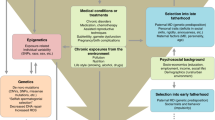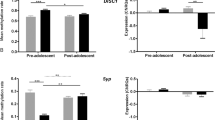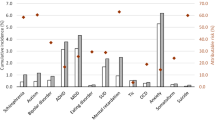Abstract
Whether delaying fatherhood leads to more mutations, thereby resulting in adverse psychiatric outcomes in offspring, remains under debate. No study has directly examined the role of de novo mutations (DNMs) between paternal age and offspring psychiatric outcomes. This study aimed to explore the association between paternal age, the number of DNMs, and age at onset of schizophrenia by sequencing the whole genome of multiplex schizophrenia families. Whole-genome sequencing (30x) was performed in 5 Taiwanese families, each comprising 3 co-affected siblings and healthy parents. Causal mediation analyses were used to explore the mediating role of DNMs in the paternal age effect. Paternal age predicted increased DNMs (+1.50 DNMs/year, 95% CI: 0.81, 2.19, p < 0.0001) over maternal age (+0.09 DNMs/year, 95% CI: −1.01, 1.19, p = 0.87). The effect of paternal age on the number of DNMs varied across families. Each additional DNM resulted in a 0.16-year earlier onset age of schizophrenia (95% CI: 0.04, 0.27, p = 0.009). The estimated direct effect of paternal age on the onset of schizophrenia was −0.82 (95% CI: −0.90, −0.73), while the indirect effect through DNMs was −0.32 (95% CI: −0.47, −0.17). The proportion mediated via DNMs was 28.04% (95% CI: 18.19%, 37.89%). The mediation analyses showed that 30% of the observed association of paternal age with onset age of schizophrenia might be mediated through paternal age-related DNMs. Our study, the first to directly quantify the mediating effect of DNMs, provides support for a causal role of paternal age-related mutations in the increased psychiatric risk in offspring.
This is a preview of subscription content, access via your institution
Access options
Subscribe to this journal
Receive 12 print issues and online access
$259.00 per year
only $21.58 per issue
Buy this article
- Purchase on SpringerLink
- Instant access to the full article PDF.
USD 39.95
Prices may be subject to local taxes which are calculated during checkout





Similar content being viewed by others
Data availability
The data that support the findings of this study are not publicly available due to conditions in the participant consent and other ethical restrictions.
References
Jimbo M, Kunisaki K, Ghaed M, Yu Y, Flores H, Hotaling J. Fertility in the aging male: a systematic review. Fertil Steril. 2022;118:1022–34.
de Kluiver H, Buizer‐Voskamp JE, Dolan CV, Boomsma DI. Paternal age and psychiatric disorders: a review. Am J Med Genet B Neuropsychiatr Genet. 2017;174B:202–13.
Janecka M, Mill J, Basson M, Goriely A, Spiers H, Reichenberg A, et al. Advanced paternal age effects in neurodevelopmental disorders—review of potential underlying mechanisms. Transl Psychiatry. 2017;7:e1019.
Couture V, Delisle S, Mercier A, Pennings G. The other face of advanced paternal age: a scoping review of its terminological, social, public health, psychological, ethical and regulatory aspects. Hum Reprod Update. 2021;27:305–23.
Frans EM, Sandin S, Reichenberg A, Lichtenstein P, Langstrom N, Hultman CM. Advancing paternal age and bipolar disorder. Arch Gen Psychiatry. 2008;65:1034–40.
Grigoroiu-Serbanescu M, Wickramaratne PJ, Mihailescu R, Prelipceanu D, Sima D, Codreanu M, et al. Paternal age effect on age of onset in bipolar I disorder is mediated by sex and family history. Am J Med Genet B Neuropsychiatr Genet. 2012;159B:567–79.
Malaspina D, Harlap S, Fennig S, Heiman D, Nahon D, Feldman D, et al. Advancing paternal age and the risk of schizophrenia. Arch Gen Psychiatry. 2001;58:361–7.
Reichenberg A, Gross R, Weiser M, Bresnahan M, Silverman J, Harlap S, et al. Advancing paternal age and autism. Arch Gen Psychiatry. 2006;63:1026–32.
Zammit S, Allebeck P, Dalman C, Lundberg I, Hemmingson T, Owen MJ, et al. Paternal age and risk for schizophrenia. Br J Psychiatry. 2003;183:405–8.
Miller B, Messias E, Miettunen J, Alaraisanen A, Jarvelin M-R, Koponen H, et al. Meta-analysis of paternal age and schizophrenia risk in male versus female offspring. Schizophr Bull. 2011;37:1039–47.
McGrath JJ, Petersen L, Agerbo E, Mors O, Mortensen PB, Pedersen CB. A comprehensive assessment of parental age and psychiatric disorders. JAMA Psychiatry. 2014;71:301–9.
Racinea SE, Culberta KM, Burta SA, Klumpa KL. Advanced paternal age at birth: phenotypic and etiologic associations with eating pathology in offspring. Psychol Med. 2014;44:1029–41.
D’Onofrio BM, Rickert ME, Frans E, Kuja-Halkola R, Almqvist C, Sjolander A, et al. Paternal age at childbearing and offspring psychiatric and academic morbidity. JAMA Psychiatry. 2014;71:432–8.
Javaras K, Rickert ME, Thornton LM, Peat CM, Baker JH, Birgegård A, et al. Paternal age at childbirth and eating disorders in offspring. Psychol Med. 2017;47:576–84.
Lan K-C, Chiang H-J, Huang T-L, Chiou Y-J, Hsu T-Y, Ou Y-C, et al. Association between paternal age and risk of schizophrenia: a nationwide population–based study. J Assist Reprod Genet. 2021;38:85–93.
Gao Y, Yu Y, Xiao J, Luo J, Zhang Y, Tian Y, et al. Association of grandparental and parental age at childbirth with autism spectrum disorder in children. JAMA Netw Open. 2020;3:e202868–e202868.
Wang SH, Hsiao PC, Yeh LL, Liu CM, Liu CC, Hwang TJ, et al. Advanced paternal age and early-onset of schizophrenia in sporadic cases: not confounded by parental polygenic risk to schizophrenia. Biol Psychiatry. 2019;86:56–64.
Malaspina D. Paternal factors and schizophrenia risk: de novo mutations and imprinting. Schizophr Bull. 2001;27:379–93.
Kong A, Frigge ML, Masson G, Besenbacher S, Sulem P, Magnusson G, et al. Rate of de novo mutations and the importance of father’s age to disease risk. Nature. 2012;488:471–5.
Turner TN, Coe BP, Dickel DE, Hoekzema K, Nelson BJ, Zody MC, et al. Genomic patterns of de novo mutation in simplex autism. Cell. 2017;171:710–22.
The Deciphering Developmental Disorders Study. Prevalence and architecture of de novo mutations in developmental disorders. Nature. 2017;542:433–8.
Goes FS, Pirooznia M, Tehan M, Zandi PP, McGrath J, Wolyniec P, et al. De novo variation in bipolar disorder. Mol Psychiatry. 2019;10:1038.
Howrigan DP, Rose SA, Samocha KE, Fromer M, Cerrato F, Chen WJ, et al. Exome sequencing in schizophrenia-affected parent–offspring trios reveals risk conferred by protein-coding de novo mutations. Nat Neurosci. 2020;23:185–93.
Jónsson H, Sulem P, Arnadottir GA, Pálsson G, Eggertsson HP, Kristmundsdottir S, et al. Multiple transmissions of de novo mutations in families. Nat Genet. 2018;50:1674–80.
Jónsson H, Sulem P, Kehr B, Kristmundsdottir S, Zink F, Hjartarson E, et al. Parental influence on human germline de novo mutations in 1548 trios from Iceland. Nature. 2017;549:519–22.
Goldmann J, Veltman J, Gilissen C. De novo mutations reflect development and aging of the human germline. Trends Genet. 2019;35:828–39.
Wong WS, Solomon BD, Bodian DL, Kothiyal P, Eley G, Huddleston KC, et al. New observations on maternal age effect on germline de novo mutations. Nat Commun. 2016;7:10486.
Consortium GotN. Whole-genome sequence variation, population structure and demographic history of the Dutch population. Nat Genet. 2014;46:818–25.
Goldmann JM, Wong WS, Pinelli M, Farrah T, Bodian D, Stittrich AB, et al. Parent-of-origin-specific signatures of de novo mutations. Nat Genet. 2016;48:935–9.
Goriely A, McGrath JJ, Hultman CM, Wilkie AOM, Malaspina D. Selfish spermatogonial selection”: a novel mechanism for the association between advanced paternal age and neurodevelopmental disorders. Am J Psychiatry. 2013;170:599–608.
Taylor JL, Debost J-CP, Morton SU, Wigdor EM, Heyne HO, Lal D, et al. Paternal-age-related de novo mutations and risk for five disorders. Nat Commun. 2019;10:3043.
Rahbari R, Wuster A, Lindsay SJ, Hardwick RJ, Alexandrov LB, Al Turki S, et al. Timing, rates and spectra of human germline mutation. Nat Genet. 2016;48:126–33.
Sasani TA, Pedersen BS, Gao Z, Baird L, Przeworski M, Jorde LB, et al. Large, three-generation human families reveal post-zygotic mosaicism and variability in germline mutation accumulation. Elife. 2019;8:e46922.
Ek M, Wicks S, Svensson AC, Idring S, Dalman C. Advancing paternal age and schizophrenia: the impact of delayed fatherhood. Schizophr Bull. 2015;41:708–14.
Petersen L, Mortensen PB, Pedersen CB. Paternal age at birth of first child and risk of schizophrenia. Am J Psychiatry. 2011;168:82–88.
Weiser M, Fenchel D, Frenkel O, Fruchter E, Burshtein S, Yehuda AB, et al. Understanding the association between advanced paternal age and schizophrenia and bipolar disorder. Psychol Med. 2020;50:431–7.
D’onofrio BM, Lahey BB, Turkheimer E, Lichtenstein P. Critical need for family-based, quasi-experimental designs in integrating genetic and social science research. Am J Public Health. 2013;103:S46–S55.
Wang SH, Liu CM, Hwu HG, Hsiao CK, Chen WJ. Association of older paternal age with earlier onset among co-affected schizophrenia sib-pairs. Psychol Med. 2015;45:2205–13.
Li Y, Sjölander A, Song H, Cnattingius S, Fang F, Yang Q, et al. Associations of parental and perinatal factors with subsequent risk of stress-related disorders: a nationwide cohort study with sibling comparison. Mol Psychiatry. 2022;27:1712–9.
Frans EM, Sandin S, Reichenberg A, Langstrom N, Lichtenstein P, McGrath JJ, et al. Autism risk across generations: a population-based study of advancing grandpaternal and paternal age. JAMA Psychiatry. 2013;70:516–21.
Frans EM, McGrath JJ, Sandin S, Lichtenstein P, Reichenberg A, Langstrom N, et al. Advanced paternal and grandpaternal age and schizophrenia: a three-generation perspective. Schizophr Res. 2011;133:120–4.
Wang S-H, Wu C-S, Hsu L-Y, Lin M-C, Chen P-C, Thompson WK, et al. Paternal age and 13 psychiatric disorders in the offspring: a population-based cohort study of 7 million children in Taiwan. Mol Psychiatry. 2022;27:5244–54.
Addington AM, Rapoport JL. The genetics of childhood-onset schizophrenia: when madness strikes the prepubescent. Curr Psychiatry Rep. 2009;11:156–61.
Walsh T, McClellan JM, McCarthy SE, Addington AM, Pierce SB, Cooper GM, et al. Rare structural variants disrupt multiple genes in neurodevelopmental pathways in schizophrenia. Science. 2008;320:539–43.
Ahn K, Gotay N, Andersen T, Anvari A, Gochman P, Lee Y, et al. High rate of disease-related copy number variations in childhood onset schizophrenia. Mol Psychiatry. 2014;19:568–72.
Hwu H-G, Faraone SV, Liu C-M, Chen WJ, Liu S-K, Shieh M-H, et al. Taiwan schizophrenia linkage study: the field study. Am J Med Genet B Neuropsychiatr Genet. 2005;134B:30–36.
Chen WJ. Taiwan schizophrenia linkage study: Lessons learned from endophenotype‐based genome‐wide linkage scans and perspective. Am J Med Genet B Neuropsychiatr Genet. 2013;162:636–47.
Diagnostic Interview for Genetic Studies. National Institute of Mental Health, Rockville, MD. 1992.
Nurnberger JI Jr., Blehar MC, Kaufmann CA, York-Cooler C, Simpson SG, Harkavy-Friedman J, et al. Diagnostic interview for genetic studies. Rationale, unique features, and training. NIMH Genetics Initiative. Arch Gen Psychiatry. 1994;51:849–59. discussion 863-844
Chen WJ, Liu SK, Chang CJ, Lien YJ, Chang YH, Hwu HG. Sustained attention deficit and schizotypal personality features in nonpsychotic relatives of schizophrenic patients. Am J Psychiatry. 1998;155:1214–20.
Family Interview for Genetic Studies. National Institute of Mental Health, Rockville, MD. 1992.
Hwu H-G. Descriptive psychiatric data schedules: II personal, social and clinical data schedules: establishment and reliability studies. Bull Chin Soc Neurol Psychiatry. 1985;11:47–56.
Van der Auwera GA, Carneiro MO, Hartl C, Poplin R, Del Angel G, Levy‐Moonshine A, et al. From FastQ data to high‐confidence variant calls: the genome analysis toolkit best practices pipeline. Curr Protoc Bioinformatics. 2013;43:11.10. 11–11.10. 33.
Cingolani P, Platts A, Wang LL, Coon M, Nguyen T, Wang L, et al. A program for annotating and predicting the effects of single nucleotide polymorphisms, SnpEff: SNPs in the genome of Drosophila melanogaster strain w1118; iso-2; iso-3. Fly (Austin). 2012;6:80–92.
Samocha KE, Robinson EB, Sanders SJ, Stevens C, Sabo A, McGrath LM, et al. A framework for the interpretation of de novo mutation in human disease. Nat Genet. 2014;46:944–50.
Hsu JS, Wu DC, Shih SH, Liu JF, Tsai YC, Lee TL, et al. Complete genomic profiles of 1496 Taiwanese reveal curated medical insights. J Adv Res. 2024;66:197–207.
Liang K-Y, Zeger SL. Longitudinal data analysis using generalized linear models. Biometrika. 1986;73:13–22.
Lee H, Cashin AG, Lamb SE, Hopewell S, Vansteelandt S, VanderWeele TJ, et al. A guideline for reporting mediation analyses of randomized trials and observational studies: the AGReMA statement. JAMA. 2021;326:1045–56.
VanderWeele T. Explanation in causal inference: Methods for mediation and interaction. Oxford University Press; 2015.
Cheng C, Spiegelman D, Li F. Estimating the natural indirect effect and the mediation proportion via the product method. BMC Med Res Methodol. 2021;21:1–20.
Oehlert GW. A note on the delta method. Am Stat. 1992;46:27–9.
Ditlevsen S, Christensen U, Lynch J, Damsgaard MT, Keiding N. The mediation proportion: a structural equation approach for estimating the proportion of exposure effect on outcome explained by an intermediate variable. Epidemiology. 2005;16:114–20.
Gratten J, Wray NR, Peyrot WJ, McGrath JJ, Visscher PM, Goddard ME. Risk of psychiatric illness from advanced paternal age is not predominantly from de novo mutations. Nat Genet. 2016;48:718–24.
Perrin MC, Brown AS, Malaspina D. Aberrant epigenetic regulation could explain the relationship of paternal age to schizophrenia. Schizophr Bull. 2007;33:1270–3.
Atsem S, Reichenbach J, Potabattula R, Dittrich M, Nava C, Depienne C, et al. Paternal age effects on sperm FOXK1 and KCNA7 methylation and transmission into the next generation. Hum Mol Genet. 2016;25:4996–5005.
Denomme MM, Haywood ME, Parks JC, Schoolcraft WB, Katz‐Jaffe MG. The inherited methylome landscape is directly altered with paternal aging and associated with offspring neurodevelopmental disorders. Aging Cell. 2020;19:e13178.
Khachadourian V, Zaks N, Lin E, Reichenberg A, Janecka M. Advanced paternal age and risk of schizophrenia in offspring–Review of epidemiological findings and potential mechanisms. Schizophr Res. 2021;233:72–9.
Harris K, Pritchard JK. Rapid evolution of the human mutation spectrum. eLife. 2017;6:e24284.
Funding
This study was supported by the Taiwan Ministry of Science and Technology (MOST 106-2314-B-039-052-MY2; MOST 108-2314-B-039-030-MY3) and National Science and Technology Council (NSTC112-2628-B-400-003-MY3). Y.A.F acknowledged support from the NSTC (NSTC 112-2314-B-002-200-MY3) and the Yushan Young Fellow Program provided by the Ministry of Education (MOE; NTU-112V1020-2).
Author information
Authors and Affiliations
Contributions
SHW initiated and designed the study. YCF and SHW drafted the manuscript. YCF, MCL, CFC, and SHW analyzed the data. WJC, JSH, CML, HWH, YTH, and TPL interpreted the data and criticised the manuscript for important intellectual content. All the authors approved the final version of the manuscript.
Corresponding authors
Ethics declarations
Competing interests
The authors declare no competing interest.
Ethics approval and consent to participate
Methods were carried out in accordance with the relevant guidelines and regulations. This study was approved by the National Taiwan University Hospital Research Ethics Committee (201709030RIN). Informed consent was obtained from all participants.
Additional information
Publisher’s note Springer Nature remains neutral with regard to jurisdictional claims in published maps and institutional affiliations.
Supplementary information
Rights and permissions
Springer Nature or its licensor (e.g. a society or other partner) holds exclusive rights to this article under a publishing agreement with the author(s) or other rightsholder(s); author self-archiving of the accepted manuscript version of this article is solely governed by the terms of such publishing agreement and applicable law.
About this article
Cite this article
Feng, YC.A., Chen, W.J., Lin, MC. et al. Paternal age, de novo mutation, and age at onset among co-affected schizophrenia sib-pairs: whole-genome sequencing in multiplex families. Mol Psychiatry 30, 3560–3567 (2025). https://doi.org/10.1038/s41380-025-02942-0
Received:
Revised:
Accepted:
Published:
Version of record:
Issue date:
DOI: https://doi.org/10.1038/s41380-025-02942-0



